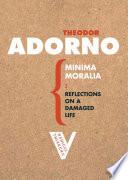Quotes from book
Minima Moralia

Minima Moralia: Reflections From Damaged Life is a 1951 book by the philosopher Theodor W. Adorno and a seminal text in critical theory. Adorno started writing it during World War II, in 1944, while he lived as an exile in America, and completed it in 1949. It was originally written for the fiftieth birthday of his friend and collaborator Max Horkheimer, who had co-authored the earlier book Dialectic of Enlightenment with Adorno.

Das Zentrum der geistigen Selbstdisziplin als solcher ist in Zersetzung begriffen. Die Tabus, die den geistigen Rang eines Menschen ausmachen, oftmals sedimentierte Erfahrungen und unartikulierte Erkenntnisse, richten sich stets gegen eigene Regungen, die er verdammen lernte, die aber so stark sind, daß nur eine fraglose und unbefragte Instanz ihnen Einhalt gebieten kann. Was fürs Triebleben gilt, gilt fürs geistige nicht minder: der Maler und Komponist, der diese und jene Farbenzusammenstellung oder Akkordverbindung als kitschig sich untersagt, der Schriftsteller, dem sprachliche Konfigurationen als banal oder pedantisch auf die Nerven gehen, reagiert so heftig gegen sie, weil in ihm selber Schichten sind, die es dorthin lockt. Die Absage ans herrschende Unwesen der Kultur setzt voraus, daß man an diesem selber genug teilhat, um es gleichsam in den eigenen Fingern zucken zu fühlen, daß man aber zugleich aus dieser Teilhabe Kräfte zog, sie zu kündigen. Diese Kräfte, die als solche des individuellen Widerstands in Erscheinung treten, sind darum doch keineswegs selber bloß individueller Art. Das intellektuelle Gewissen, in dem sie sich zusammenfassen, hat ein gesellschaftliches Moment so gut wie das moralische Überich. Es bildet sich an einer Vorstellung von der richtigen Gesellschaft und deren Bürgern. Läßt einmal diese Vorstellung nach—und wer könnte noch blind vertrauend ihr sich überlassen—, so verliert der intellektuelle Drang nach unten seine Hemmung, und aller Unrat, den die barbarische Kultur im Individuum zurückgelassen hat, Halbbildung, sich Gehenlassen, plumpe Vertraulichkeit, Ungeschliffenheit, kommt zum Vorschein. Meist rationalisiert es sich auch noch als Humanität, als den Willen, anderen Menschen sich verständlich zu machen, als welterfahrene Verantwortlichkeit. Aber das Opfer der intellektuellen Selbstdisziplin fällt dem, der es auf sich nimmt, viel zu leicht, als daß man ihm glauben dürfte, daß es eines ist.
E. Jephcott, trans. (1974), § 8
Minima Moralia (1951)

Die traurige Wissenschaft, aus der ich meinem Freunde einiges darbiete, bezieht sich auf einen Bereich, der für undenkliche Zeiten als der eigentliche der Philosophie galt, seit deren Verwandlung in Methode aber der intellektuellen Nichtachtung, der sententiösen Willkür und am Ende der Vergessenheit verfiel: die Lehre vom richtigen Leben. Was einmal den Philosophen Leben hieß, ist zur Sphäre des Privaten und dann bloß noch des Konsums geworden, die als Anhang des materiellen Produktionsprozesses, ohne Autonomie und ohne eigene Substanz, mit geschleift wird.
E. Jephcott, trans. (1974), Dedication
Minima Moralia (1951)

Der vage Ausdruck erlaubt dem, der ihn vernimmt, das ungefähr sich vorzustellen, was ihm genehm ist und was er ohnehin meint. Der strenge erzwingt Eindeutigkeit der Auffassung, die Anstrengung des Begriffs, deren die Menschen bewußt entwöhnt werden, und mutet ihnen vor allem Inhalt Suspension der gängigen Urteile, damit ein sich Absondern zu, dem sie heftig widerstreben. Nur, was sie nicht erst zu verstehen brauchen, gilt ihnen für verständlich; nur das in Wahrheit Entfremdete, das vom Kommerz geprägte Wort berührt sie als vertraut.
E. Jephcott, trans. (1974), § 64
Minima Moralia (1951)

“Wrong life cannot be lived rightly.”
Es gibt kein richtiges Leben im falschen.
E. Jephcott, trans. (1974), § 18
Minima Moralia (1951)

“The straight line is regarded as the shortest distance between two people, as if they were points.”
Nun gilt für die kürzeste Verbindung zwischen zwei Personen die Gerade, so als ob sie Punkte wären.
E. Jephcott, trans. (1974), § 20
Minima Moralia (1951)

“Art is magic delivered from the lie of being truth.”
Kunst ist Magie, befreit von der Lüge, Wahrheit zu sein.
E. Jephcott, trans. (1974), § 143
Minima Moralia (1951)

E. Jephcott, trans. (1974), § 1
Minima Moralia (1951)
Context: The son of well-to-do parents who … engages in a so-called intellectual profession, as an artist or a scholar, will have a particularly difficult time with those bearing the distasteful title of colleagues. It is not merely that his independence is envied, the seriousness of his intentions mistrusted, that he is suspected of being a secret envoy of the established powers. … The real resistance lies elsewhere. The occupation with things of the mind has by now itself become “practical,” a business with strict division of labor, departments and restricted entry. The man of independent means who chooses it out of repugnance for the ignominy of earning money will not be disposed to acknowledge the fact. For this he is punished. He … is ranked in the competitive hierarchy as a dilettante no matter how well he knows his subject, and must, if he wants to make a career, show himself even more resolutely blinkered than the most inveterate specialist. The urge to suspend the division of labor which, within certain limits, his economic situation enables him to satisfy, is thought particularly disreputable: it betrays a disinclination to sanction the operations imposed by society, and domineering competence permits no such idiosyncrasies. The departmentalization of mind is a means of abolishing mind where it is not exercised ex officio, under contract. It performs this task all the more reliably since anyone who repudiates this division of labor—if only by taking pleasure in his work—makes himself vulnerable by its standards, in ways inseparable from elements of his superiority. Thus is order ensured: some have to play the game because they cannot otherwise live, and those who could live otherwise are kept out because they do not want to play the game.